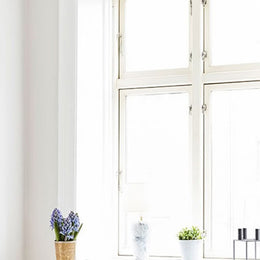Hello friends!
Today, we want to share with you a little behind-the-scenes glimpse into the process behind our popular art print – the Seasonal Fruits and Vegetables Arts Print.We strive to eat locally and seasonally as much as we can, and we often found ourselves at the grocery store wondering what was in season…and when? Though there were seasonality charts available online, we couldn’t find something that was both functional and beautiful enough to hang up in our kitchen. Given our design background, we challenged ourselves to create a custom print that would fit in our home and serve as a reference.
Step 1: Paint, paint, paint

We had been spending our weekends painting mini-illustrations of food, so we started focusing on the fruits and vegetables we wanted to include in the seasonal chart. We painted 50+ fruits and vegetables for this chart alone (Check out our second bilingual Instagram account @lyrafrench for more food art)
Step 2: Research
This part isn't visually exciting, but we spent a day compiling data about the seasonality of different fruits and vegetables - then we input the data into an Excel spreadsheet. We cross-referenced a few different sources to make sure our information was aligned.
Step 3: Diagram & Concept
Because we want to give a general idea of what foods are in season during which month (and we are not tailoring to a specific year or harvest), we had some flexibility in terms of how to represent the information.
We considered a few options – the simplest way would be to create a simple grid format, with each grid representing a season. However, this format would not allow for perennially in-season produce.
We quickly decided that a circular diagram fit the cyclical nature of seasonal produce much better. Our first idea – using concentric arcs for each fruit/vegetable – was precise though limiting, and the illustrations would be too small.

In order to create a design that would be informative but still show our handmade illustrations, we ultimately decided on the “pizza” (our very non-technical term) layout, with supplementary text below the chart.

Step 4: Digital Layout & Testing
For this print, we spent about two full days laying out various iterations – surprisingly, this part actually took the longest time. We used Photoshop to color balance and clean up our scanned illustrations, and then spent a day just making sure the fruits and vegetables were in the right slices of the diagram. The sizing of each illustration and the balance of colors in the overall diagram were both taken into account.

Once we were happy with this final layout, we added the supplementary text as a secondary clarification, and we were finished!
And because we also love incorporating language into everyday life – we translated the print into both French and Spanish :)
Hope you enjoyed this peek into our process! As always, if you have any questions about our prints, feel free to contact us at hello@lyrapress.com.
Thank you for reading!
Crystal + Jorge




